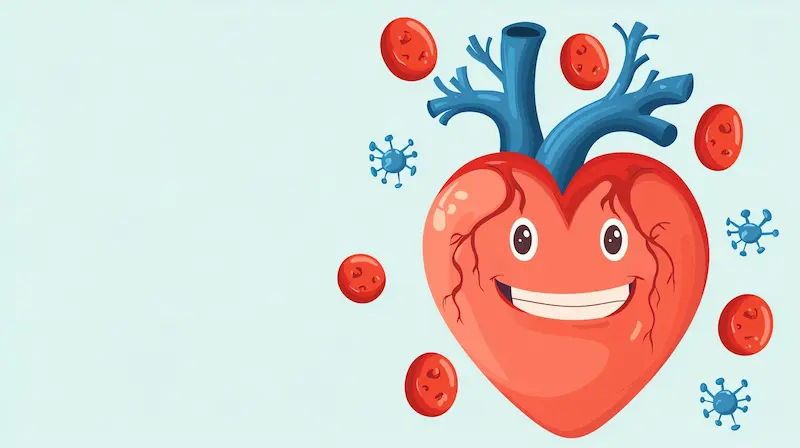Guide to Subtle Signs You Might Have A Heart Problem
Are you overlooking a warning sign? Discover 10+ subtle symptoms that could point to an underlying heart problem and when you need to see a doctor. Read the full guide.

Written by Dr. Mohammed Kamran
Reviewed by Dr. Shaik Abdul Kalam MD (Physician)
Last updated on 13th Jan, 2026

Introduction
Not every heart problem announces itself with a dramatic, crushing chest pain. Often, the heart speaks in whispers: unexplained tiredness, shortness of breath with everyday tasks, a “heartburn” that doesn’t behave like usual, or a fluttering heartbeat that comes and goes. These subtle changes are easy to brush off, but they can be early clues that the heart needs attention.
In this guide, we’ll unpack the subtle signs you might have a heart problem, who’s most at risk, and how to know when to seek urgent help. We’ll distinguish common, non-cardiac issues from heart-related symptoms, explore differences in how women and people with diabetes or older adults present, and show you simple at-home checks you can do safely. You’ll also learn what tests doctors use to evaluate the heart and how to prevent problems in the first place. If symptoms persist beyond two weeks, consult a doctor online with Apollo24|7 for further evaluation.
Why Subtle Heart Problems Get Missed?
Heart disease is often called “silent” for a reason: symptoms can be mild, intermittent, or easily mistaken for something else. Up to about 45% of heart attacks are “silent,” meaning they occur without classic chest pain and are often discovered later on an ECG or imaging [1]. The nerve pathways from the heart can overlap with those from the jaw, back, and stomach, so the brain sometimes mislabels cardiac pain as indigestion, muscle strain, or dental issues.
Women, older adults, and people with diabetes are particularly likely to experience atypical symptoms. Women more commonly report shortness of breath, nausea, back or jaw pain, and fatigue rather than classic chest pain [6][8][9]. Diabetes can damage nerves (neuropathy), blunting pain signals so that ischemia (reduced blood flow) causes little or no chest pain—hence “silent ischemia”. Older adults may interpret fatigue and breathlessness as “just aging,” delaying care.
Two takeaways:
• Small symptoms, big stakes: A cluster of mild, unusual symptoms—especially with exertion—can point to the heart.
• Context matters: Risk factors like diabetes, high blood pressure, smoking, high LDL, and family history lower the threshold for concern.
Unique insight: Keep a simple “symptom calendar.” If minor symptoms happen during similar activities (e.g., climbing two flights of stairs) and resolve with rest, that pattern itself is a red flag for heart-related issues (angina) [3][4].
Consult a Top General Physician
Chest Discomfort: Beyond the Movie Heart Attack
The stereotypical heart attack—severe, crushing chest pain—is well known. But many heart-related chest sensations are subtler: pressure, fullness, tightness, or burning that might be confused with heartburn. This discomfort may last more than a few minutes or come and go, and it often worsens with exertion or stress, improving with rest.
Heartburn vs heart pain: Clues to tell them apart
• Timing: Heart-related discomfort often appears with physical effort (walking uphill, carrying groceries) and eases with rest. Typical acid reflux is more related to meals, lying down after eating, or certain foods.
• Quality and spread: Cardiac pain can radiate to the arm (especially left), neck, jaw, back, or shoulder. Reflux pain usually stays central and might respond to antacids.
• Accompaniments: Shortness of breath, cold sweat, lightheadedness, or nausea alongside chest discomfort increases the likelihood of a heart origin.
The exertion-and-rest pattern (angina)
Angina is chest discomfort due to temporarily reduced blood flow to the heart muscle. Stable angina appears predictably with exertion and eases with rest. New-onset, worsening, or rest angina can signal impending heart attack and needs urgent care. Silent heart attack symptoms can also mimic heartburn, so persistent “indigestion” deserves attention—especially in people with risk factors. If chest discomfort is severe, persistent, or accompanied by breathlessness, sweating, or faintness, call emergency services immediately.
Long-tail terms used: is heartburn a sign of a heart attack; how to tell if chest pain is heart-related.
Breathlessness and Unusual Fatigue
Shortness of breath (dyspnea) that is out of proportion to your activity level—especially if new—can be a heart clue. People often notice it first on stairs, hills, or when carrying loads. Some describe it as “I just can’t catch my breath,” or “I feel winded doing simple things I used to handle easily.” This can reflect coronary artery disease, valve problems, or early heart failure.
Unusual fatigue is a particularly important, subtle sign—common in women. Fatigue that lingers for days or weeks, especially alongside breathlessness or poor exercise tolerance, warrants a closer look [6][8]. In heart failure, reduced pumping ability leads to fluid back-up in the lungs and poor oxygen delivery to tissues, causing breathlessness and tiredness during routine tasks.
Nighttime breathlessness
• OrthopneA. Needing extra pillows to sleep comfortably, or feeling breathless when lying flat.
• Paroxysmal nocturnal dyspnea (PND): Suddenly waking at night gasping for air and needing to sit up.
If breathlessness is sudden or severe, with chest tightness or faintness, seek emergency care. If you have persistent exertional breathlessness or fatigue lasting beyond two weeks, consult a doctor online with Apollo24|7 for further evaluation. Shortness of breath heart vs asthma can be tricky; heart-related breathlessness often comes with swelling, weight gain, or orthopnea, while asthma tends to include wheeze and responds to inhalers.
Unique insight: The “stair snapshot.” If you consistently need to stop at the same step to catch your breath, track it. Worsening over weeks suggests a heart or lung issue that deserves prompt medical review.
Long-tail terms used: shortness of breath heart vs asthma; fatigue sign of heart disease.
Atypical Pain in the Jaw, Neck, Back, Shoulder, or Arm
Heart pain is often “referred,” meaning the brain interprets it as coming from other areas due to shared nerve pathways. Jaw pain (sometimes mistaken for dental issues), neck stiffness, upper back or shoulder pain, or pain radiating down one or both arms—especially the left—can be cardiac in origin. For women, back and jaw pain are common atypical presentations.
Real-world scenarios:
• A middle-aged person experiences nagging upper back pain and shortness of breath when hustling through the airport, which resolves with rest—later found to have coronary artery disease.
• A woman develops jaw tightness and nausea during brisk walks, with no chest pain—this may be angina.
Clues to consider:
• Pattern with exertion: Pain triggered by physical or emotional stress, relieved by rest.
• Associated symptoms: Nausea, sweating, lightheadedness, or breathlessness alongside pain raise suspicion.
• Risk matters: In someone with diabetes, high LDL, smoking history, or family history of early heart disease, even subtle pain patterns deserve medical attention
Never ignore new, unexplained pain in these areas if it’s triggered by activity or comes with other heart-attack symptoms. If it’s intense, unrelenting, or combined with shortness of breath or sweating, call emergency services right away.
Long-tail terms used: jaw pain, heart attack female; early signs of heart problems you might miss.
Palpitations and Dizziness: Could It Be an Arrhythmia?
Palpitations—feeling like your heart is racing, skipping, pounding, or fluttering—can be benign, but they can also signal an arrhythmia such as atrial fibrillation (AFib) or supraventricular tachycardia. AFib is common and sometimes subtle, presenting as reduced exercise tolerance, fatigue, or breathlessness rather than obvious palpitations. Untreated AFib increases stroke risk.
Warning signs that palpitations need evaluation:
• Associated symptoms: Dizziness, lightheadedness, near-fainting (presyncope), fainting (syncope), chest discomfort, or shortness of breath.
• Duration/frequency: Episodes lasting more than a few minutes, happening frequently, or worsening over time.
• Rest or exertion pattern: Palpitations triggered by activity could indicate a more significant rhythm issue.
Anxiety vs arrhythmiA. The difference between anxiety and heart palpitations can be subtle. Anxiety-related palpitations often come with a sense of fear, tingling, and may relate to stressors; arrhythmias can appear out of the blue, sometimes with exercise, and may cause lightheadedness or breathlessness.
Evaluation often includes a resting ECG, blood tests (thyroid, electrolytes), and ambulatory monitoring (Holter or event monitor) to capture intermittent episodes [3][4]. If palpitations are persistent, occur with fainting, or coincide with chest pain or breathlessness, seek urgent care.
Unique insight: Track “triggers and recoveries.” Note caffeine, alcohol, fever, dehydration, or sleep loss before episodes; how quickly your heart rate returns to normal after exertion (heart rate recovery) can also offer clues to cardiovascular fitness and autonomic function.
Long-tail terms used: arrhythmia symptoms to watch; difference between anxiety and heart palpitations.
Swelling, Sudden Weight Gain, and a Persistent Cough
Fluid build-up from heart failure can cause ankle and foot swelling (peripheral edema), tight shoes or rings by day’s end, and sudden weight gain (e.g., 1–2 kg in a few days). Fluid in the lungs can cause a persistent cough, especially when lying down, sometimes with wheezing. People may also notice needing to urinate more at night (nocturia) as the body shifts fluid when lying flat.
Clues that swelling is heart-related:
• Symmetry: Both ankles/legs tend to swell (though one can be worse).
• Timing: Worse later in the day; improves overnight.
• Associated symptoms: Fatigue, breathlessness, orthopnea (needing extra pillows), PND.
The “shoe and scale” checks:
• Shoe test: Shoes feel tight most afternoons after being fine in the morning.
• Scale trend: Sudden weight gain >1–2 kg in 2–3 days suggests fluid retention.
When to act: Seek urgent care for breathlessness at rest, pink frothy sputum, chest pain, or faintness. For gradual swelling and exertional breathlessness, book a timely visit—if symptoms persist beyond two weeks, consult a doctor online with Apollo24|7 for guidance. Early heart failure management reduces hospitalizations and improves quality of life.
Unique insight: Sodium “sneaks.” Even without adding salt, processed foods and restaurant meals can add substantial sodium, worsening fluid retention. Reading labels and choosing low-sodium options can make a rapid difference in swelling and breathlessness for many people.
Surprising Clues: Digestion, Sleep Apnea, Sexual Health, Skin
Digestion: Nausea, indigestion, or a sense of fullness can be heart-related, particularly during exertion or stress. Loss of appetite and early satiety can appear in heart failure as the gut becomes congested with fluid. Silent heart attack symptoms may present as indigestion-like discomfort, especially in women and people with diabetes.
Sleep apneA. Loud snoring, witnessed breathing pauses, morning headaches, and daytime sleepiness are hallmarks of obstructive sleep apnea (OSA), which raises the risk of hypertension, AFib, heart failure, and coronary disease. Treating sleep apnea can improve blood pressure and reduce arrhythmia burden.
Sexual health: Erectile dysfunction (ED) can be an early warning of vascular disease, often appearing several years before coronary symptoms. The penile arteries are narrower than coronary arteries, so ED may precede heart symptoms in men with atherosclerosis. Reduced sexual desire or new difficulty with arousal in any sex may relate to cardiovascular health, medications, or hormonal changes.
Skin and extremities: Cool hands/feet, pale or bluish lips (cyanosis), or delayed capillary refill can suggest poor perfusion. While not specific to the heart, in the right context (breathlessness, fatigue), these warrant attention.
Unique insight: Think “plumbing first.” If a symptom hints at poor blood flow—like ED or cool extremities—ask whether it could reflect a broader vascular issue. Addressing blood pressure, lipids, smoking, and sleep apnea early pays dividends.
Who’s at Higher Risk—and Why That Changes the Threshold for Action?
Risk factors don’t just increase the chance of heart disease—they also change how we interpret mild symptoms. If you have any of the following, take subtle signs more seriously:
• Diabetes, high blood pressure, high LDL or low HDL cholesterol
• Smoking or vaping nicotine
• Family history of early heart disease (men <55, women <65)
• Chronic kidney disease, autoimmune disease, pregnancy-related hypertension/pre-eclampsia history
• Sedentary lifestyle, obesity
Risk calculators (such as pooled cohort equations) estimate 10-year cardiovascular risk to guide prevention. Even if your calculated risk is “intermediate,” a strong family history or high coronary artery calcium score may prompt more aggressive prevention.
Screening tests your clinician might order:
• Blood tests: Lipid profile, HbA1c (for diabetes), kidney and thyroid function
• Blood pressure monitoring, ambulatory BP if needed
• Resting ECG, possibly a coronary calcium scan for selected patients
If you have multiple risk factors and new subtle symptoms—like exertional breathlessness or chest pressure—err on the side of earlier evaluation. Apollo24|7 offers convenient home collection for tests like lipid profile or HbA1c, which can help quantify risk while you plan a follow-up.
What To Do Next?: Urgent vs Routine, Tests, and Follow-up
Urgent: Call emergency services immediately if you have chest pressure/tightness/pain, shortness of breath, cold sweat, nausea, lightheadedness, or pain radiating to the jaw/back/arm—especially if symptoms are severe, last >5–10 minutes, or recur [2][6]. Don’t drive yourself.
Soon (days to a week): If you notice persistent exertional symptoms (breathlessness, chest pressure, fatigue), new or frequent palpitations, ankle swelling, or nighttime breathlessness, arrange a timely medical appointment. If symptoms persist beyond two weeks, consult a doctor online with Apollo24|7 for further evaluation or book a physical visit for a hands-on exam.
What evaluation looks like:
• History and exam: Pattern of symptoms, risk factors, family history.
• ECG: Looks for rhythm problems or prior heart damage.
• Blood tests: Troponin (if acute), lipid profile, HbA1c, thyroid, kidney function. Apollo24|7 offers home collection for many labs to streamline care.
• Imaging: Echocardiogram to assess structure and pumping function; chest X-ray for heart size and lung fluid.
• Functional tests: Exercise ECG or stress imaging to uncover reduced blood flow; ambulatory monitor (Holter/event) for arrhythmias.
Unique insight: Ask about your “plan for the next episode.” If you’ve had concerning but not emergent symptoms, leave your visit with a clear action plan: which symptoms trigger emergency care, which merit a call within 24–48 hours, and what self-checks to keep (symptom diary, daily weights for heart failure, BP log).
Prevention You Can Start Today
Small, consistent changes protect the heart and can even improve subtle symptoms:
• Move most days: Aim for at least 150 minutes/week of moderate activity (e.g., brisk walking). Even 10-minute bouts count. Add two days of muscle strengthening.
• Eat for your arteries: Emphasize vegetables, fruits, whole grains, legumes, nuts, fish; limit processed foods, added sugars, and sodium. The Mediterranean or DASH pattern is heart-protective.
• Sleep 7–9 hours and screen for sleep apnea if loud snoring, witnessed apneas, or daytime sleepiness are present.
• Manage stress: Brief daily practices—breathwork, a walk outdoors, short mindfulness—lower blood pressure and help arrhythmias.
• Don’t smoke or vape; if you do, get help to quit.
• Take medications as prescribed: For blood pressure, cholesterol (statins), diabetes, and other conditions.
• Vaccinate: Flu and COVID infections can stress the heart; staying up to date reduces complications.
If your condition does not improve after trying these methods, book a physical visit to a doctor with Apollo24|7 for a tailored plan.
Unique insight: Bundle habits. Pair a 10-minute walk with a favorite podcast and a glass of water afterwards—simple pairing boosts consistency. Consistency, not perfection, makes the difference.
Consult a Top General Physician
Conclusion
Subtle does not mean insignificant—especially when it comes to your heart. Shortness of breath you can’t explain, unusual fatigue, indigestion-like discomfort that appears with activity, pain in the jaw or back, swelling of the ankles, or new palpitations are all small signals worth paying attention to. These symptoms can be easy to dismiss, but in the context of risk factors like high blood pressure, diabetes, high LDL cholesterol, smoking, or a strong family history, they warrant prompt evaluation.
By understanding how the heart can “whisper,” you can respond early: track patterns, notice exertion triggers, and act quickly when symptoms are severe or persistent. If you’re unsure, err on the side of caution—timely care saves heart muscle and lives. If symptoms persist beyond two weeks or you’d like guidance on risk testing, consult a doctor online with Apollo24|7, and consider convenient home collections for labs like lipid profile and HbA1c. Pair that with heart-healthy habits—move more, eat well, sleep better, manage stress—and you’ll not only reduce risk but also feel better day to day. Your heart deserves attentive listening; let these early hints guide you to proactive, confident care.
Consult a Top General Physician

Dr Vinay Kumar A V
Nephrologist
8 Years • MBBS, MD - General Medicine, DM - Nephrology
Bilaspur
Apollo Hospitals Seepat Road, Bilaspur
Dr. Indrajit Das
General Physician/ Internal Medicine Specialist
4 Years • "MD (Internal medicine) : Gauhati Medical College and Hospital, Guwahati (2018-2021) MD (Pathology) : Gauhati Medical College and Hospital, Guwahati (2012-2015) MBBS (Bachelor of Medicine, Bachelor of Surgery) : Silchar Medical College, Assam (2003-2008) "
Guwahati
Apollo Excelcare Hospital, Guwahati

Dr. Hariprasath J
General Physician/ Internal Medicine Specialist
19 Years • MD (Gen Med), FCCP, Dip (Diabetology, UK)
Chennai
Apollo First Med Hospitals P H Road, Chennai
(225+ Patients)

Dr. Ajay K Sinha
General Physician/ Internal Medicine Specialist
30 Years • MD, Internal Medicine
Delhi
Apollo Hospitals Indraprastha, Delhi
(200+ Patients)

Dr. Tanmaya Kumar Sahu
General Physician/ Internal Medicine Specialist
12 Years • MBBS, MD ( Internal Medicine )
Bhubaneswar
Apollo Hospitals Old Sainik School Road, Bhubaneswar
(25+ Patients)
Consult a Top General Physician

Dr Vinay Kumar A V
Nephrologist
8 Years • MBBS, MD - General Medicine, DM - Nephrology
Bilaspur
Apollo Hospitals Seepat Road, Bilaspur
Dr. Indrajit Das
General Physician/ Internal Medicine Specialist
4 Years • "MD (Internal medicine) : Gauhati Medical College and Hospital, Guwahati (2018-2021) MD (Pathology) : Gauhati Medical College and Hospital, Guwahati (2012-2015) MBBS (Bachelor of Medicine, Bachelor of Surgery) : Silchar Medical College, Assam (2003-2008) "
Guwahati
Apollo Excelcare Hospital, Guwahati

Dr. Hariprasath J
General Physician/ Internal Medicine Specialist
19 Years • MD (Gen Med), FCCP, Dip (Diabetology, UK)
Chennai
Apollo First Med Hospitals P H Road, Chennai
(225+ Patients)

Dr. Ajay K Sinha
General Physician/ Internal Medicine Specialist
30 Years • MD, Internal Medicine
Delhi
Apollo Hospitals Indraprastha, Delhi
(200+ Patients)

Dr. Tanmaya Kumar Sahu
General Physician/ Internal Medicine Specialist
12 Years • MBBS, MD ( Internal Medicine )
Bhubaneswar
Apollo Hospitals Old Sainik School Road, Bhubaneswar
(25+ Patients)
More articles from Heart disease
Frequently Asked Questions
Q1. What are silent heart attack symptoms I should know?
Silent heart attack symptoms can include mild chest pressure, shortness of breath, unusual fatigue, indigestion-like discomfort, back or jaw pain, or nausea—often without classic severe chest pain. Such silent heart attack symptoms are more common in people with diabetes and women. Seek evaluation if these persist or recur, especially with exertion.
Q2. How can I tell if my chest pain is heart-related or heartburn?
Heart-related discomfort often appears with exertion and eases with rest; it may spread to the arm, jaw, or back and be accompanied by sweating, nausea, or breathlessness. Heartburn typically follows meals, lying down, or trigger foods and may respond to antacids. When in doubt—or if symptoms are severe or persistent—go to the emergency department.
Q3. Are palpitations always serious, or just anxiety?
Many palpitations are benign, but if you have dizziness, fainting, chest discomfort, breathlessness, or episodes during exercise, it could be an arrhythmia. The difference between anxiety and heart palpitations can be subtle; consider an ECG and possibly a Holter monitor. If symptoms persist beyond two weeks, consult a doctor online with Apollo24|7.
Q4. Can ankle swelling mean heart problems?
Yes. Bilateral ankle/foot swelling, sudden weight gain, and nighttime breathlessness can suggest fluid build-up from heart failure, especially when paired with fatigue and shortness of breath. Track daily weights and seek timely evaluation.
Q5. Which tests check for heart problems?
Depending on symptoms, tests may include ECG, blood tests (troponin if acute, lipid profile, HbA1c, thyroid), echocardiogram, chest X-ray, stress test, and ambulatory monitoring for arrhythmias. Apollo24|7 offers home collections for common labs like lipid profile and HbA1c.


